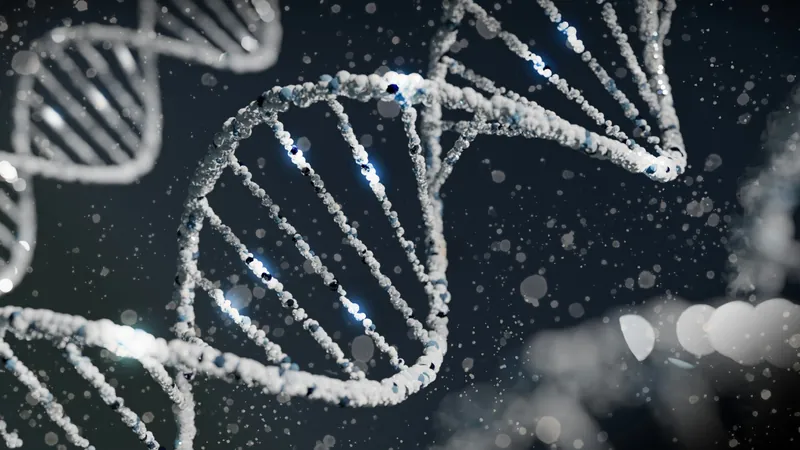
Groundbreaking Discovery Revolutionizes Genetic Research by Turning Trash into Treasure!
2024-11-08
Author: Ming
Groundbreaking Discovery Revolutionizes Genetic Research by Turning Trash into Treasure!
In a remarkable breakthrough, research scientist Yosuke Tanigawa and Professor Manolis Kellis from the Massachusetts Institute of Technology (MIT) have unveiled a groundbreaking methodology that transforms how scientists view clinical measurements that traditionally fall "below the limit of quantification" (BLQ). This pioneering work, published in the American Journal of Human Genetics, introduces “hypometric genetics,” a new avenue that capitalizes on often-overlooked data to make significant strides in genetic research.
Imagine trying to gauge the weight of a feather on a basic bathroom scale—a measurement so light that the scale simply registers its presence without providing an actual weight. In scientific terms, these scenarios are what researchers call measurements that fall BLQ. Standard practice usually sees scientists discarding these data points to avoid skewing results with unreliable information. However, Tanigawa and Kellis argue that this discarded data can be a treasure trove of insights, crucial for advancing personalized medicine and drug development!
“Current practices often treat these BLQ data points as insignificant or as missing pieces,” says Kellis. “However, our findings demonstrate that these flagged measurements harbor vital genetic insights.” By re-evaluating how such data is utilized, the researchers aim to rescue discarded statistics and effectively discover potential genetic associations that were previously missed.
In a study involving over 220,000 de-identified participants from the UK Biobank, the duo unveiled that genetic factors heavily influence the occurrence of BLQ flags concerning specific lipid molecules in blood samples. By marrying this new understanding with standard quantitative data, they identified genetic associations with an astounding 2.8 times more candidate genes compared to traditional methods. This approach sheds light on rare genetic variants with pronounced effects, paving the way for new discoveries concerning trait-related genes, and accelerating the hunt for therapeutic targets.
“Our methodology departs from the norm of focusing predominantly on individuals with extreme trait values,” Tanigawa elaborated. “Instead, we harness BLQ as a marker for extremely low measurement values, thereby unlocking rich genetic information that can enhance our understanding significantly.”
The impact of this study hasn’t gone unnoticed in the scientific community. Yukinori Okada, a professor from the Graduate School of Medicine at the University of Tokyo, praised their work: “Tanigawa’s research addresses a critical and often ignored dilemma of assessing 'missing' clinical values in human genomics. Their innovative use of binarized BLQ data will be invaluable for advancing personalized genomic therapies.”
Looking ahead, Tanigawa envisions this technique transforming how pharmaceutical companies approach therapeutic development. “With human genetic evidence being a catalyst for successful therapeutic discovery, our method can optimize the efforts by maximizing findings from data that were once overlooked,” he stated. “This approach offers a cost-effective solution to enhance genetic discovery while requiring fewer subjects.”
But the excitement doesn’t stop there! Tanigawa and his team are also eager to extend this innovative methodology to other biological data types, including proteomics and RNA expression, which could open new frontiers in genetic research and dramatically deepen our understanding of complex biological systems.
This revolutionary approach promises to reshape the landscape of genetic research, making it not only more efficient but also potentially unlocking the next wave of pharmaceutical innovations. Stay tuned as more discoveries unfold from this groundbreaking work!

 Brasil (PT)
Brasil (PT)
 Canada (EN)
Canada (EN)
 Chile (ES)
Chile (ES)
 España (ES)
España (ES)
 France (FR)
France (FR)
 Hong Kong (EN)
Hong Kong (EN)
 Italia (IT)
Italia (IT)
 日本 (JA)
日本 (JA)
 Magyarország (HU)
Magyarország (HU)
 Norge (NO)
Norge (NO)
 Polska (PL)
Polska (PL)
 Schweiz (DE)
Schweiz (DE)
 Singapore (EN)
Singapore (EN)
 Sverige (SV)
Sverige (SV)
 Suomi (FI)
Suomi (FI)
 Türkiye (TR)
Türkiye (TR)